50 kreative Ideen für Mitarbeiteranreize im Jahr 2025, um das Engagement zu steigern
Entdecken Sie 50 innovative Anreizprogramme für Mitarbeiter, die die Arbeitsmoral und Produktivität steigern und eine positive Arbeitsplatzkultur fördern.
Auf dieser Seite
- Was ist ein Anreiz für Arbeitnehmer?
- Warum sind Anreize für Mitarbeiter wichtig?
- 25 Ideen für Anreize für Mitarbeiter
- 25 Ideen für Anreize für externe Mitarbeiter
- 11. Virtuelle Mittagessen mit Managementteams
- Woran Sie erkennen, dass Ihr Programm für Mitarbeiteranreize funktioniert
- Zusammenfassung mit den wichtigsten Erkenntnissen
- FAQs
In der heutigen wettbewerbsorientierten Geschäftswelt ist die Umsetzung wirkungsvoller Ideen für Mitarbeiteranreize von entscheidender Bedeutung für die Steigerung von Motivation, Engagement und Mitarbeiterbindung. Durchdachte Incentive-Ideen können über Standard-Belohnungen hinausgehen, um Begeisterung zu wecken, die Loyalität zu erhöhen und ein stärkeres Gefühl der Team-Einheit zu fördern.
Laut dem IRF 2024 Trendberichtsind Incentive-Ideen nicht nur Vergünstigungen, sondern wirksame Instrumente, um auf dem angespannten Arbeitsmarkt Spitzenkräfte zu gewinnen und zu halten. Sie sind entscheidend für die Gestaltung der Unternehmenskultur und die Schaffung von Verbindungen zwischen verstreuten Teams.
Dieser Artikel befasst sich mit verschiedenen effektiven Ideen für Mitarbeiteranreize, geht auf ihre Wirkung ein, zeigt praktische Beispiele auf und erörtert, wie sie auf die individuellen Bedürfnisse Ihrer Belegschaft zugeschnitten werden können.
Was ist ein Anreiz für Arbeitnehmer?
Anreize für Mitarbeiter sind Belohnungen oder Vorteile, die Arbeitgeber anbieten, um Mitarbeiter zu motivieren und zu ermutigen, ihre Leistung zu steigern und die Unternehmensziele zu erreichen.
Die Forschung Die Forschung zeigt, dass gut strukturierte Anreizprogramme für Mitarbeiter sehr effektiv sein können. Solche Programme verbessern die Arbeitsmoral, die Produktivität und die Loyalität des Teams und sind gleichzeitig auf die Unternehmensziele und die Bedürfnisse der Mitarbeiter abgestimmt.
Diese Anreize können verschiedene Formen annehmen, z. B. finanzielle Belohnungen, Anerkennung oder zusätzliche Leistungen. Diese Programme zielen darauf ab, ein positives Arbeitsumfeld zu fördern, die Mitarbeiterzufriedenheit zu steigern und die Gesamtproduktivität zu verbessern.
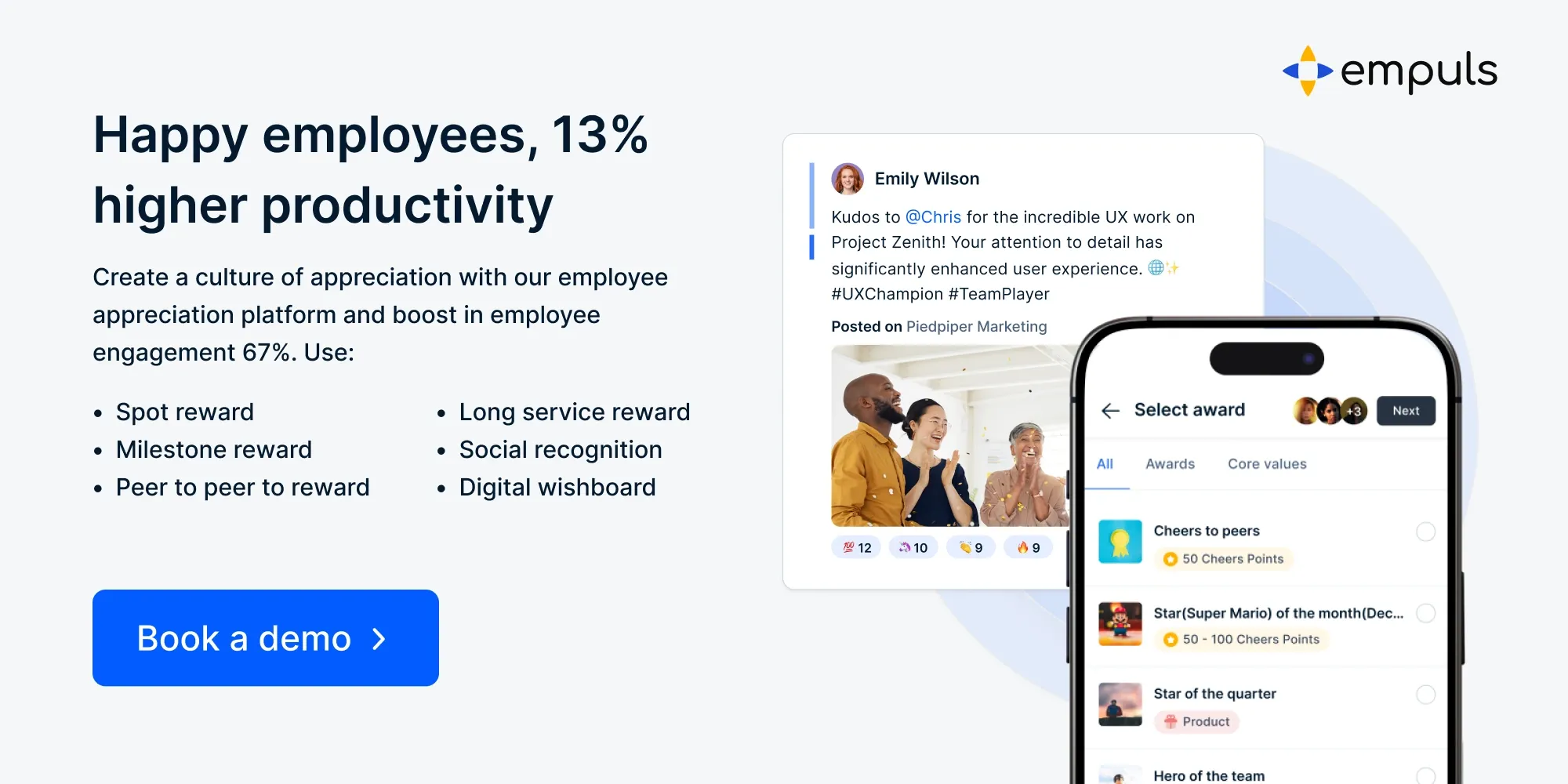
Warum sind Anreize für Mitarbeiter wichtig?
Die Umsetzung wirksamer Ideen für Mitarbeiteranreize ist für Unternehmen von großer Bedeutung. Diese Anreize dienen als treibende Kraft, die die Mitarbeiter dazu anspornt, ihr Bestes zu geben und zu einem dynamischeren Arbeitsplatz beizutragen. Lassen Sie uns die verschiedenen Gründe untersuchen, warum Anreize für Mitarbeiter wichtig sind:
- Höhere Produktivität: Wenn die Mitarbeiter wissen, dass ihre harte Arbeit belohnt wird, werden sie sich wahrscheinlich mehr anstrengen. Dieser Produktivitätsschub kann zu einer höheren Qualität des Outputs und einer besseren Gesamtleistung führen.
- Mitarbeiterbindung: Hohe Fluktuationsraten können für Unternehmen finanziell und in Form von verlorenem Wissen und Erfahrung kostspielig sein. Anreize können die Loyalität der Mitarbeiter erhöhen und die Fluktuation verringern, da die Mitarbeiter eher bei einem Unternehmen bleiben, das ihre Bemühungen anerkennt und belohnt.
- Bessere Arbeitsmoral: Anreize tragen zu einer positiven Arbeitsplatzkultur bei. Wenn sich die Mitarbeiter wertgeschätzt und anerkannt fühlen, fördert dies das Gefühl der Zugehörigkeit und die Arbeitsmoral. Eine motivierte Belegschaft ist oft hilfsbereiter und bereit, die Extrameile zu gehen.
- Ermutigung zu gewünschtem Verhalten: Anreize können so gestaltet werden, dass sie bestimmte Verhaltensweisen oder Leistungen fördern, z. B. das Erreichen von Verkaufszielen, die Verbesserung des Kundendienstes oder die Verbesserung der Zusammenarbeit im Team. Indem sie Anreize auf die Unternehmensziele abstimmen, können Unternehmen das Verhalten ihrer Mitarbeiter in eine konstruktive Richtung lenken.
- Talente anziehen: Ein solides Anreizprogramm kann ein wirksames Instrument sein, um Spitzenkräfte anzuziehen. Potenzielle Mitarbeiter suchen oft nach Unternehmen, die mehr bieten als nur ein Gehalt. Ein umfassendes Leistungspaket mit verschiedenen Anreizoptionen kann die Attraktivität eines Unternehmens für Arbeitssuchende erhöhen.
Hilcorp Energy Company ist ein bemerkenswertes Beispiel für die erfolgreiche Umsetzung von Leistungsanreizen für die Mitarbeiter. Im Jahr 2010 versprach das Unternehmen seinen Mitarbeitern, dass jeder Mitarbeiter einen Bonus von 100.000 USD erhalten würde, wenn es ihm gelänge, die Produktionsraten und Reserven bis 2015 zu verdoppeln.
Dieses ehrgeizige Ziel motivierte die Mitarbeiter und förderte ein starkes Gefühl der Teamarbeit und Verantwortlichkeit. Die Aussicht auf beträchtliche finanzielle Belohnungen schuf einen überzeugenden Anreiz für die Mitarbeiter, gemeinsam auf das Erreichen der Unternehmensziele hinzuarbeiten.
Zu den von Hilcorp angewandten Methoden gehörten die Festlegung klarer, messbarer Ziele und das Angebot beträchtlicher finanzieller Anreize, die direkt an die Leistungsergebnisse gebunden waren.
Die Anreizstruktur richtete die individuellen Bemühungen auf die umfassenderen finanziellen Ziele des Unternehmens aus und förderte so das Engagement und den Einsatz der Mitarbeiter. Darüber hinaus ermutigten solche Anreize die Mitarbeiter, sich ihre Aufgaben zu eigen zu machen, da sie wussten, dass ihre Beiträge zu beträchtlichen persönlichen Belohnungen führen konnten.
Als Ergebnis dieser Initiativen erreichte Hilcorp seine Produktionsziele und baute eine hoch motivierte Belegschaft auf. Das Unternehmen meldete erhebliche Produktivitäts- und Moralsteigerungen, was die Wirksamkeit gut strukturierter Anreizprogramme für die Mitarbeiter belegt.
Dieser Fall veranschaulicht, wie finanzielle Anreize Mitarbeiter motivieren und letztlich die Leistung und den Erfolg des Unternehmens steigern können. Lassen Sie uns gemeinsam eine Liste von Ideen für Mitarbeiteranreize erstellen, die Sie in diesem Jahr ausprobieren sollten.
25 Ideen für Anreize für Mitarbeiter
1. Leistungsprämien
Die Gewährung von Leistungsprämien ist ein klassischer, aber wirksamer Anreiz für Mitarbeiter. Mit dieser monetären Belohnung werden nicht nur die individuellen Beiträge gewürdigt, sondern die Mitarbeiter werden auch motiviert, sich in ihren Aufgaben zu übertreffen. Klare Kriterien für den Erhalt dieser Prämien können die Zufriedenheit und das Engagement der Mitarbeiter erhöhen und so eine Kultur der hohen Leistung fördern.
2. Anerkennungsprogramme
Die Einführung von Anerkennungsprogrammen kann die Arbeitsmoral der Mitarbeiter erheblich steigern. Die Würdigung von Leistungen, sei es durch Auszeichnungen oder öffentliche Anerkennungen, trägt dazu bei, dass sich die Mitarbeiter wertgeschätzt und anerkannt fühlen. Solche Initiativen fördern positive Verhaltensweisen und schaffen ein förderliches Arbeitsumfeld.
Empuls bietet eine umfassende Lösung für die Implementierung effektiver Anerkennungsprogramme, die die Arbeitsmoral der Mitarbeiter deutlich verbessern können. Durch die zeitnahe und wirkungsvolle Anerkennung von Leistungen - sei es durch Auszeichnungen oder öffentliche Belobigungen Empuls stellt Empuls sicher, dass sich die Mitarbeiter wirklich wertgeschätzt und anerkannt fühlen.
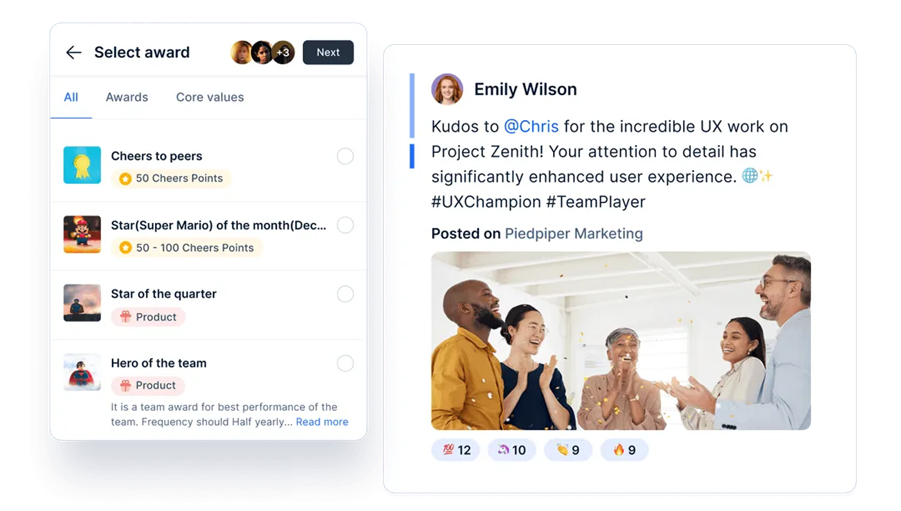
Die KI-gesteuerten Funktionen der Plattform rationalisieren den Anerkennungsprozess und machen ihn für alle demografischen Gruppen innerhalb der Belegschaft attraktiv. Dies fördert ein positives Arbeitsumfeld, das erwünschte Verhaltensweisen begünstigt und den Zusammenhalt im Team stärkt, was letztlich zu einer Kultur der Unterstützung und des hohen Mitarbeiterengagements beiträgt.
3. Flexible Arbeitsgestaltung
Flexible Arbeitszeiten oder die Möglichkeit, aus der Ferne zu arbeiten, werden von den Arbeitnehmern immer stärker nachgefragt. Indem sie Teammitgliedern die Möglichkeit geben, ihre Arbeitszeiten selbst zu bestimmen, können Unternehmen die Work-Life-Balance und die allgemeine Arbeitszufriedenheit verbessern. Dieser Ansatz schafft nicht nur Anreize für die Mitarbeiter, sondern steigert auch die Produktivität.
4. Möglichkeiten der beruflichen Entwicklung
Investitionen in die berufliche Entwicklung sind eine hervorragende Möglichkeit, Mitarbeiter zu motivieren. Der Zugang zu Schulungen, Workshops oder die Erstattung von Studiengebühren zeigt, dass das Unternehmen die Entwicklung seiner Mitarbeiter schätzt. Dies steigert nicht nur die Leistung der Mitarbeiter, sondern fördert auch ihre Loyalität und Bindung.
5. Wellness-Programme
Die Einführung von Wellness-Programmen kann das Wohlbefinden der Mitarbeiter erheblich steigern. Das Angebot von Mitgliedschaften in Fitnessstudios, Yogakursen oder Tagen der geistigen Gesundheit ermutigt die Mitarbeiter, ihrer Gesundheit Priorität einzuräumen. Die Konzentration auf das Wohlbefinden kann zu einer höheren Produktivität und geringeren Fehlzeiten führen.
6. Gewinnbeteiligung
Gewinnbeteiligungspläne ermöglichen es den Mitarbeitern, direkt vom Erfolg des Unternehmens zu profitieren. Wenn die Teammitglieder wissen, dass sie einen Anteil am Gewinn erhalten, ist das ein Anreiz für sie, härter zu arbeiten und ihre Ziele mit den Zielen des Unternehmens in Einklang zu bringen. Dieser finanzielle Anreiz fördert das Gefühl der Eigenverantwortung bei den Mitarbeitern.
7. Teamausflüge
Die Organisation von Teamausflügen kann die Beziehungen zwischen den Mitarbeitern stärken und die Zusammenarbeit verbessern. Diese Erlebnisse bieten eine Pause von der Routine und ermöglichen es den Teammitgliedern, sich außerhalb des Arbeitsumfelds kennenzulernen. Aktivitäten, die Spaß machen, können die Zufriedenheit und Moral der Mitarbeiter steigern.
8. Geldprämien für Erfolge
Geldprämien für besondere Leistungen können ein starker Motivator für die Mitarbeiter sein. Diese monetären Anreize sind eine Anerkennung für harte Arbeit und ermutigen die Teammitglieder, sich bei ihren Aufgaben um Spitzenleistungen zu bemühen. Klare Richtlinien, wie diese Belohnungen verdient werden können, können ihre Wirksamkeit erhöhen.
9. Geschenkkarten
Durch die Bereitstellung von Geschenkkarten als Anreiz können die Mitarbeiter ihre Belohnungen nach persönlichen Vorlieben auswählen. Durch diese Flexibilität wird sichergestellt, dass die Belohnungen bei den einzelnen Teammitgliedern ankommen und ihr Gesamterlebnis bei der Arbeit verbessern. Geschenkkarten sind ein einfaches, aber effektives Mittel, um Wertschätzung zu zeigen.
Empuls bietet eine optimierte Lösung für die Bereitstellung von Geschenkkarten als Mitarbeiteranreiz, mit der Unternehmen ihre Anerkennungsprogramme effektiv verbessern können. Mit dem Zugang zu einem vielfältigen Katalog von über 21.000 Geschenkkartenoptionen in mehr als 75 Ländern ermöglicht Empuls den Mitarbeitern, Prämien auszuwählen, die ihren persönlichen Vorlieben entsprechen.
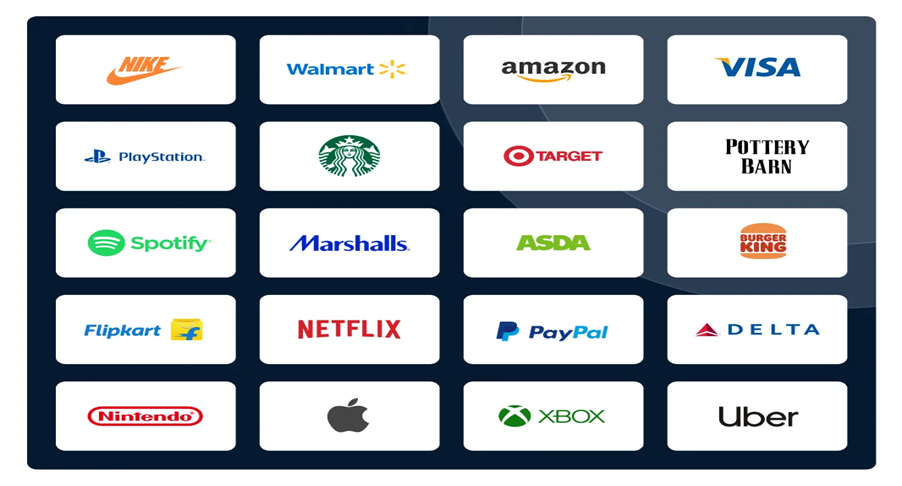
Diese Flexibilität stellt nicht nur sicher, dass die Belohnungen auf individueller Ebene ankommen, sondern fördert auch eine Kultur der Wertschätzung am Arbeitsplatz. Durch die Vereinfachung des Verteilungs- und Einlösungsprozesses macht Empuls es Unternehmen leicht, echte Wertschätzung zu zeigen, was letztendlich zu einer höheren Mitarbeiterzufriedenheit und -bindung beiträgt.
10. Mitarbeiterbeteiligungsprogramme
Durch die Einführung von Mitarbeiterbeteiligungsprogrammen (ESOPs) werden die Mitarbeiter am Erfolg des Unternehmens beteiligt. Dieser finanzielle Anreiz bringt die Interessen der Mitarbeiter mit denen des Unternehmens in Einklang und motiviert sie, einen positiven Beitrag zur Erreichung der Unternehmensziele zu leisten.
11. Tage der legeren Kleidung
Eine legere Kleidung kann eine entspanntere Atmosphäre am Arbeitsplatz schaffen. Dieser einfache Anreiz sorgt dafür, dass sich die Mitarbeiter wohl und wertgeschätzt fühlen und fördert gleichzeitig eine positive Unternehmenskultur. Es ist eine einfache Möglichkeit, die Arbeitsmoral ohne große Kosten zu verbessern.
12. Mentoring-Programme
Die Einrichtung von Mentorenprogrammen hilft den Mitarbeitern, sich beruflich weiterzuentwickeln und gleichzeitig starke Beziehungen innerhalb des Unternehmens zu pflegen. Die Zusammenarbeit von weniger erfahrenen Teammitgliedern mit erfahrenen Fachleuten fördert den Wissensaustausch und die persönliche Entwicklung und steigert die Arbeitszufriedenheit.
13. Handelswaren des Unternehmens
Die Bereitstellung von Markenartikeln des Unternehmens als Belohnung kann das Zugehörigkeitsgefühl der Mitarbeiter fördern. Artikel wie T-Shirts oder Tassen dienen als tägliche Erinnerung an die Verbundenheit mit dem Unternehmen und fördern die Moral und das Engagement.
14. Ehrenamtliche Tätigkeiten
Wenn Sie Ihre Mitarbeiter ermutigen, sich an freiwilligen Aktivitäten zu beteiligen, können Sie ihr Gefühl für den Sinn ihrer Arbeit stärken. Die Unterstützung von Anliegen, die ihnen am Herzen liegen, fördert nicht nur die Kameradschaft, sondern stärkt auch die Bindungen zur Gemeinschaft, so dass sich die Mitarbeiter sowohl persönlich als auch beruflich wertgeschätzt fühlen.
15. Doppelte Pausen
Das Anbieten von Doppelpausen als Anreiz ermöglicht verdienten Mitarbeitern eine zusätzliche Auszeit vom Schreibtisch, ohne die Produktivität wesentlich zu beeinträchtigen. Diese kleine Geste zeigt die Wertschätzung für harte Arbeit und fördert gleichzeitig eine gesunde Work-Life-Balance.
16. Leistungen der Krankenversicherung
Umfassende Krankenversicherungsleistungen sind entscheidend, um Talente zu gewinnen und zu halten. Mitarbeiter, die sich in Bezug auf ihren Krankenversicherungsschutz sicher fühlen, sind eher bereit, sich voll auf ihre Aufgaben einzulassen, was zu einer besseren Arbeitsleistung führt.
17. Stipendien für die Arbeit von zu Hause aus
Das Anbieten von Zuschüssen für die Einrichtung von Heimbüros oder die Kosten für die Fernarbeit zeigt, dass Sie den Komfort und die Produktivitätsbedürfnisse Ihrer externen Mitarbeiter schätzen. Diese finanzielle Unterstützung erhöht die Zufriedenheit und das Engagement der Mitarbeiter, indem sie ihnen die Möglichkeit gibt, einen effektiven Arbeitsplatz zu Hause einzurichten.
18. Zulagen für Lernen und Entwicklung
Die Bereitstellung von Mitteln für Weiterbildungsmöglichkeiten ermöglicht es den Mitarbeitern, Kurse oder Zertifizierungen zu besuchen, die sie beruflich interessieren. Diese Investition verbessert nicht nur die Fähigkeiten, sondern zeigt auch, dass das Unternehmen sich um die berufliche Entwicklung kümmert.
19. Überraschungsfreie Tage
Leistungsstarke Mitarbeiter mit einem unerwarteten freien Tag zu überraschen, kann ein wunderbarer Anreiz sein, der harte Arbeit und Engagement belohnt. Solche Gesten heben die Arbeitsmoral und verstärken positive Verhaltensweisen am Arbeitsplatz.
20. Urlaub aus familiären Gründen
Großzügige Urlaubsregelungen für Familienangehörige spiegeln eine integrative Einstellung des Arbeitgebers wider, die das Privatleben der Mitarbeiter neben ihren beruflichen Verpflichtungen wertschätzt. Dieser Ansatz unterstützt die allgemeine Arbeitszufriedenheit und fördert die Loyalität der Teammitglieder.
21. Geldprämien für Teamleistungen
Die Belohnung ganzer Teams mit Geldprämien für gemeinsame Leistungen fördert die Zusammenarbeit und die Kameradschaft unter den Teammitgliedern. Die Anerkennung von Gruppenleistungen stärkt die Teamarbeit und motiviert den Einzelnen, effektiv zur Erreichung gemeinsamer Ziele beizutragen.
22. Maßgeschneiderte Belohnungsprogramme
Mit maßgeschneiderten Prämienprogrammen können Arbeitgeber Anreize auf der Grundlage individueller Vorlieben oder Bedürfnisse innerhalb der Belegschaft schaffen.
Empuls bietet eine robuste Lösung für die Erstellung individueller Belohnungsprogramme, die auf die einzigartigen Vorlieben und Bedürfnisse Ihrer Mitarbeiter abgestimmt sind. Mit Empuls können Unternehmen diese maßgeschneiderten Programme ganz einfach über eine intuitive Plattform implementieren, die Echtzeit-Transparenz in Bezug auf Belohnungsbudgets und -optionen bietet und so sicherstellt, dass jeder Mitarbeiter die Anerkennung erhält, die ihm zusteht.

23. Anreiztechnische Herausforderungen
Ein freundschaftlicher Wettbewerb durch Incentive-Herausforderungen kann die Mitarbeiter motivieren und gleichzeitig den Teamgeist unter den Kollegen fördern. Diese Herausforderungen ermutigen zur Teilnahme auf allen Ebenen innerhalb eines Unternehmens und führen zu Leistungsverbesserungen bei verschiedenen Kennzahlen.
24. Feedback-Versammlungen
Regelmäßige Rückmeldungen der Mitarbeiter zu bestehenden Anreizprogrammen stellen sicher, dass diese relevant bleiben. Diese Praxis gibt den Mitarbeitern nicht nur die Möglichkeit, sich in die Entscheidungsprozesse einzubringen, sondern hilft den Unternehmen auch, ihre Strategien zur Steigerung der allgemeinen Arbeitszufriedenheit effektiv zu verfeinern.
25. Veranstaltungen zur Anerkennung von Mannschaften
Die Ausrichtung von Veranstaltungen, die speziell für die Anerkennung herausragender Leistungen von Teams konzipiert sind, schafft unvergessliche Erlebnisse, die den Erfolg feiern - diese Zusammenkünfte fördern den Zusammenhalt innerhalb der Abteilungen und verstärken gleichzeitig positive Verhaltensweisen, die mit den Unternehmenswerten übereinstimmen.
25 Ideen für Anreize für externe Mitarbeiter
1. Flexible Arbeitszeiten
Flexible Arbeitszeiten sind für Remote-Teams, die eine bessere Work-Life-Balance anstreben, von entscheidender Bedeutung. Die Mitarbeiter schätzen es, dass sie die Kontrolle über ihre Zeitpläne haben und so ihre persönlichen Verpflichtungen und beruflichen Aufgaben effektiv bewältigen können.
2. Virtuelle Teambuilding-Aktivitäten
Die Teilnahme an virtuellen Teambuilding-Aktivitäten fördert die Verbindung zwischen Teammitgliedern, die sich andernfalls isoliert fühlen würden. Diese Aktivitäten fördern die Zusammenarbeit und verbessern die allgemeine Arbeitsmoral in verteilten Teams.
3. Home-Office-Stipendien
Die Gewährung von Zuschüssen für die Verbesserung des Heimarbeitsplatzes zeigt das Engagement des Arbeitgebers für die Gewährleistung einer angemessenen Einrichtung für Fernarbeitskräfte - diese finanzielle Unterstützung trägt erheblich zur Steigerung der Produktivität von Fernarbeitskräften bei.
4. Abonnement von Online-Lernplattformen
Durch das Anbieten von Abonnements für Online-Lernplattformen erhalten Fernarbeitskräfte Zugang zu wertvollen Ressourcen - sie können ihre persönlichen und beruflichen Fähigkeiten verbessern und fühlen sich durch die Investition in ihre Entwicklung wertgeschätzt.
5. Erkennung auf virtuellen Plattformen
Die Entwicklung von Anerkennungsprogrammen, die speziell für virtuelle Umgebungen entwickelt wurden, ermöglicht es den Führungskräften, herausragende Beiträge von Mitarbeitern an entfernten Standorten anzuerkennen - diese Praxis verstärkt positive Verhaltensweisen und motiviert andere in verteilten Teams zu ähnlichen Leistungen.
6. Virtuelle Kaffeepausen
Die Organisation virtueller Kaffeepausen fördert den informellen Austausch zwischen Kollegen. Diese zwanglosen Zusammenkünfte tragen zum Aufbau von Beziehungen zwischen den Mitgliedern von Remote-Teams bei und verbessern gleichzeitig die Kommunikationskanäle zwischen den verschiedenen Abteilungen eines Unternehmens.
7. Wellness-Herausforderungen online
Die Umsetzung von Wellness-Herausforderungen, die auf Remote-Teams zugeschnitten sind, fördert gesunde Gewohnheiten - die Ermutigung zur Teilnahme durch einen freundschaftlichen Wettbewerb steigert das Engagement und fördert gleichzeitig die Kameradschaft unter den Kollegen, die gemeinsame Ziele in Bezug auf Initiativen zum Wohlbefinden anstreben!
8. Monatliche virtuelle Preisverleihungen
Mit monatlichen virtuellen Preisverleihungen werden außergewöhnliche Leistungen in verteilten Teams gewürdigt. Die gemeinsame Feier von Erfolgen stärkt die Kameradschaft unter den Kollegen und motiviert andere, ähnliche Meilensteine in ihrer Karriere zu erreichen!
9. Abo-Boxen als Belohnung
Das Versenden von Abo-Boxen, die mit Leckereien oder Artikeln zur Selbstpflege gefüllt sind, ist eine schöne Überraschung. Durch diese greifbaren Belohnungen fühlen sich Remote-Mitarbeiter auch dann wertgeschätzt, wenn sie aus der Ferne arbeiten, was letztlich die allgemeine Arbeitszufriedenheit in verschiedenen Abteilungen erhöht!
10. Personalisierte Danksagungen von Führungskräften
Das Versenden von persönlichen Dankesschreiben durch die Führungsebene ist eine sinnvolle Anerkennung der individuellen Beiträge. Diese einfache Geste fördert die Loyalität der Mitarbeiter, die Anerkennung mehr als nur monetäre Anreize schätzen!
Empuls bietet einen optimierten Ansatz für das Versenden von personalisierten Danksagungen von Führungskräften, der sicherstellt, dass jede Danksagung sowohl sinnvoll als auch wirkungsvoll ist. Empuls erleichtert die Erstellung maßgeschneiderter Nachrichten, die den individuellen Beitrag anerkennen, und trägt so zur Förderung einer Kultur der Wertschätzung bei, die bei externen Mitarbeitern auf große Resonanz stößt.
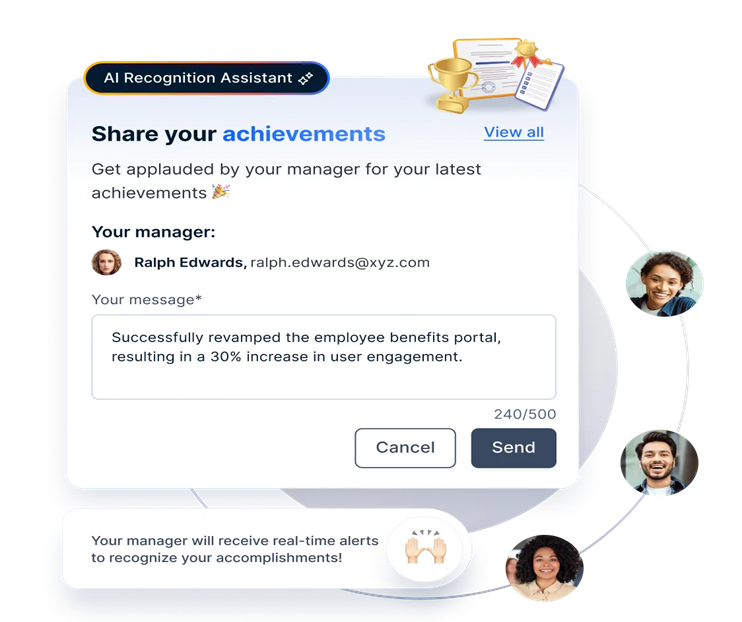
11. Virtuelle Mittagessen mit Managementteams
Die Organisation virtueller Mittagessen, bei denen sich das Management direkt mit den Mitarbeitern an anderen Standorten austauscht, bietet Gelegenheiten für einen offenen Dialog. Diese Interaktionen stärken die Beziehungen zwischen den Führungsteams und den Mitarbeitern an der Basis und fördern die Transparenz in den Unternehmenshierarchien!
12. Online-Sitzungen zum Austausch von Fachwissen
Die Förderung von Sitzungen zum Austausch von Fachwissen ermöglicht es Kollegen in verteilten Teams, Fachwissen zu verschiedenen Themen auszutauschen - diese Initiative fördert die Kultur des kontinuierlichen Lernens und verbessert gleichzeitig die Zusammenarbeit zwischen Kollegen, die aus der Ferne arbeiten!
13. Freie Tage für psychische Gesundheit
Die Gewährung ausgewiesener freier Tage für die psychische Gesundheit zeigt das Engagement des Arbeitgebers für die Förderung des emotionalen Wohlbefindens - Mitarbeiter, die sich umsorgt fühlen, sind wahrscheinlich engagierter und produktiver, wenn sie nach einer Auszeit zurückkehren!
14. Benutzerdefinierte virtuelle Hintergründe
Die Bereitstellung individueller virtueller Hintergründe mit dem Branding des Unternehmens schafft ein Gefühl der Zugehörigkeit unter den Mitarbeitern an entfernten Standorten - diese kleine Aufmerksamkeit verleiht den Videoanrufen eine persönliche Note und stärkt die Verbindung nach Hause, selbst wenn man meilenweit entfernt arbeitet!
15. Online-Bücherclubs
Die Einrichtung von Online-Buchclubs fördert die Gemeinschaftsbildung in verteilten Teams - die Mitarbeiter verbinden sich über gemeinsame Lektüre und Diskussionen, was die Kameradschaft fördert und gleichzeitig das persönliche Wachstum durch die gemeinsame Erkundung von Literatur unterstützt!
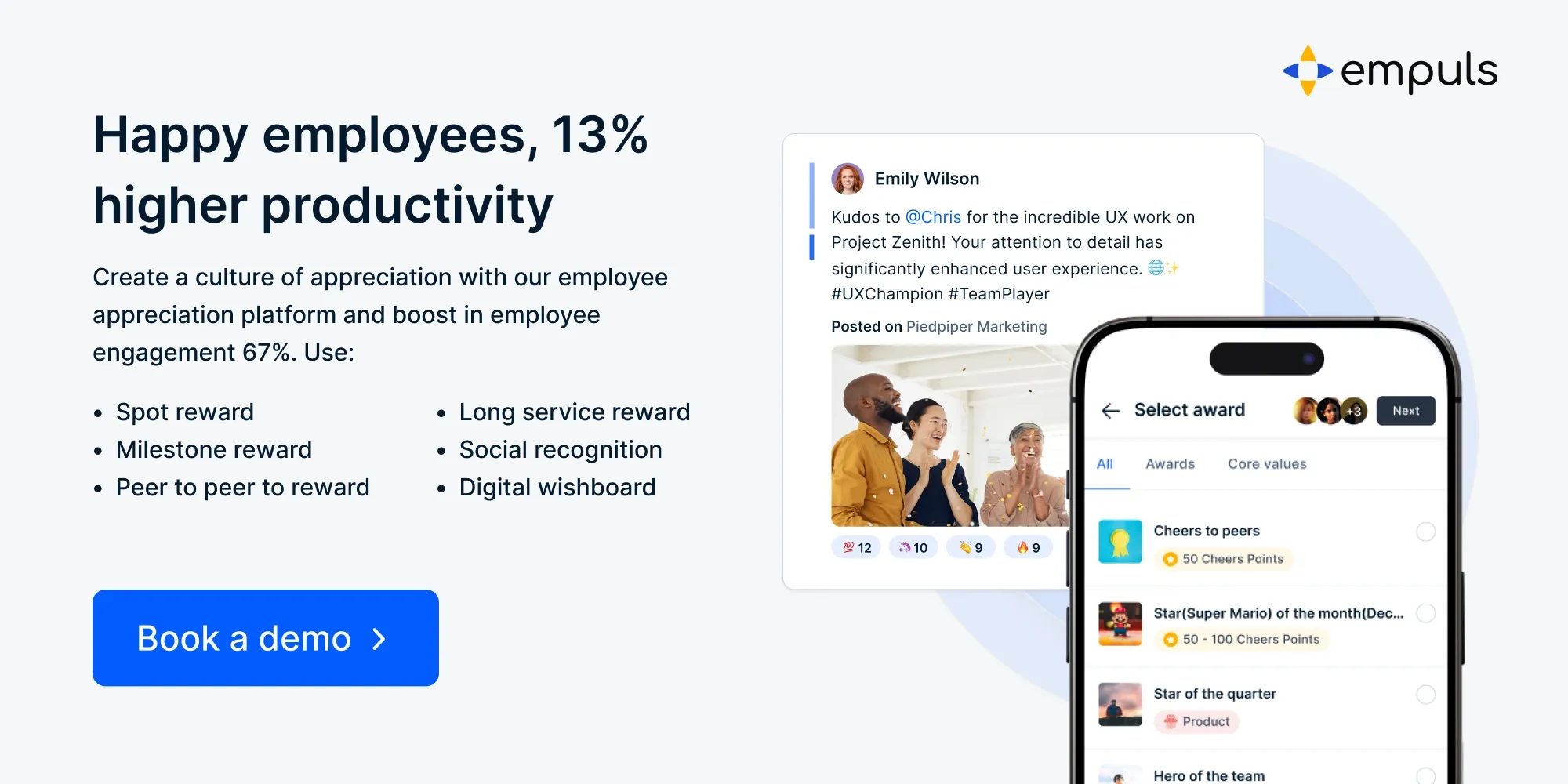
16. Monatliche Herausforderungen mit Schwerpunkt auf Teamzielen
Die Schaffung monatlicher Herausforderungen, die darauf abzielen, bestimmte Teamziele zu erreichen, motiviert alle Beteiligten - sie fördert den freundschaftlichen Wettbewerb unter den Kollegen, die gemeinsame Ziele anstreben, und verbessert die abteilungsübergreifende Zusammenarbeit aus der Ferne!
17. Virtuelle Fitnesskurse
Der Zugang zu virtuellen Fitnesskursen fördert einen gesunden Lebensstil bei Telearbeitern - die Teilnahme an diesen Kursen steigert das Energieniveau während des gesamten Tages, was sich langfristig in einer höheren Produktivität und einer größeren Arbeitszufriedenheit niederschlägt!
18. Geschenkkarten für lokale Unternehmen
Die Bereitstellung von Geschenkgutscheinen, die bei lokalen Unternehmen eingelöst werden können, unterstützt das Engagement in der Gemeinde und belohnt gleichzeitig treue Dienste - es stärkt die Bindungen zwischen Organisationen und Gemeinden gleichermaßen, wovon beide Seiten profitieren!
19. Feedback-Foren im Internet
Die Einrichtung von Online-Feedback-Foren fördert offene Kommunikationskanäle zwischen Führungskräften und Mitarbeitern an der Front - es befähigt Einzelpersonen, Ideen zur Verbesserung der Arbeitsplatzkultur beizutragen und gleichzeitig die Motivation der Mitarbeiter insgesamt zu steigern!
20. Persönliche Meilensteine virtuell zelebrieren
Das Anerkennen von persönlichen Meilensteinen wie Geburtstagen oder Jahrestagen schafft selbst in der Ferne sinnvolle Verbindungen - es zeigt die Wertschätzung für das Leben des Einzelnen außerhalb des beruflichen Umfelds und fördert die Loyalität unter den Fernmitarbeitern!
21. Virtuelle Happy Hour
Das Veranstalten von virtuellen Happy Hours bietet die Möglichkeit zu informellen Gesprächen, die über die typischen Arbeitsgespräche hinausgehen. Es stärkt die Beziehungen zwischen den Kollegen und ermöglicht ihnen, sich gemeinsam zu entspannen und positive Erinnerungen zu schaffen, auch wenn sie weit voneinander entfernt sind!
22. Zugang zu Ressourcen der psychischen Gesundheit
Die Bereitstellung von Ressourcen für die psychische Gesundheit stellt sicher, dass Unterstützungssysteme aus der Ferne verfügbar sind - Mitarbeiter, die sich emotional unterstützt fühlen, sind in der Regel engagierter und produktiver, was sich langfristig positiv auf die Unternehmenskultur auswirkt!
23. Auswahlverfahren für Fernarbeit
Die Organisation von Wettbewerben, die sich auf Kreativität oder Innovation innerhalb verteilter Teams konzentrieren, fördert die Teilnahme - sie motiviert den Einzelnen, seine Talente zur Schau zu stellen, verbessert die abteilungsübergreifende Zusammenarbeit und treibt gleichzeitig gemeinsam Leistungsverbesserungen voran!
24. Personalisierte Entwicklungspläne
Die Erstellung von personalisierten Entwicklungsplänen, die auf die Wünsche jedes Einzelnen zugeschnitten sind, zeigt das Engagement für die berufliche Weiterentwicklung und trägt dazu bei, Talente langfristig an das Unternehmen zu binden und eine kontinuierliche Verbesserung der Belegschaft zu gewährleisten.
25. Firmenjubiläen gemeinsam virtuell feiern
Die kollektive Würdigung von Firmenjubiläen stärkt die gemeinsamen Werte und Leitbilder - sie schafft ein Gefühl der Zugehörigkeit unter allen Beteiligten und erinnert alle an den Sinn und Zweck der täglich geleisteten Arbeit!
Woran Sie erkennen, dass Ihr Programm für Mitarbeiteranreize funktioniert
Um festzustellen, ob Ihre Mitarbeiter-Incentive-Programme effektiv sind, sollten Sie die folgenden Strategien in Betracht ziehen:
1. Feedback einholen:
Sammeln Sie regelmäßig Beiträge von Teammitgliedern über ihre Erfahrungen mit den Anreizen. Dies trägt dazu bei, dass sich die Mitarbeiter wertgeschätzt und engagiert fühlen.
Empuls erleichtert dies, indem es Tools zur Durchführung von Pulsumfragen anbietet, die es Unternehmen ermöglichen, die Zufriedenheit und Stimmung der Mitarbeiter in Bezug auf die Incentive-Programme zu messen. Dieses Feedback trägt dazu bei, dass sich die Mitarbeiter wertgeschätzt fühlen und sich für das Prämienprogramm engagieren, was für die Motivation der Mitarbeiter und die Steigerung der Arbeitsmoral unerlässlich ist.
2. Die Leistung der Mitarbeiter überwachen:
Verfolgen Sie die Verbesserungen bei der Arbeitsleistung und Produktivität nach der Einführung von Anreizprogrammen. Eine höhere Leistung deutet oft darauf hin, dass die Mitarbeiter durch die angebotenen Anreize motiviert sind.
Empuls bietet Analysen, mit denen Unternehmen Veränderungen in der Arbeitsleistung und Produktivität bewerten können. Durch die Analyse dieser Metriken können Unternehmen feststellen, ob ihre Incentive-Programme die Mitarbeiter effektiv dazu anregen, ihre Leistung zu verbessern und die Unternehmensziele zu erreichen.
3. Bewertung der Mitarbeiterzufriedenheit:
Führen Sie Umfragen durch, um die Zufriedenheit und Moral der Mitarbeiter zu messen. Ein hohes Maß an Zufriedenheit kann mit erfolgreichen Anreizprogrammen korrelieren, die Mitarbeiter für ihre Leistungen belohnen.
Mit Empuls können Unternehmen problemlos Umfragen durchführen, die die allgemeine Arbeitszufriedenheit und die Arbeitsmoral der Mitarbeiter bewerten. Ein hohes Maß an Zufriedenheit korreliert oft mit erfolgreichen Incentive-Programmen, die Mitarbeiter für ihre Leistungen belohnen und so die Loyalität und Bindung fördern.
4. Bewertung der Beibehaltungsquoten:
Analysieren Sie die Fluktuationsraten, um festzustellen, ob Ihre Anreizprogramme zur Bindung von Talenten beitragen. Wirksame Ideen für Mitarbeiteranreize können zu einer besseren Mitarbeiterbindung und Loyalität führen.
Es hat sich gezeigt, dass Empuls die Fluktuationsrate durch die Pflege einer Anerkennungskultur und transparente Belohnungssysteme erheblich senken kann. Dieser Ansatz bindet nicht nur die Mitarbeiter, sondern verbessert auch ihre Gesamterfahrung im Unternehmen.
5. Beobachten Sie den Grad des Engagements:
Achten Sie auf Anzeichen für ein stärkeres Engagement der Mitarbeiter, wie z. B. die Teilnahme an Wellness-Programmen oder beruflichen Weiterbildungsmöglichkeiten, die darauf hindeuten können, dass die Anreize zur Motivation der Mitarbeiter greifen.
Empuls ermutigt die Mitarbeiter, sich aktiv an diesen Initiativen zu beteiligen, was ein Zeichen dafür sein kann, dass die Anreize sie tatsächlich motivieren. Erhöhtes Engagement führt oft zu verbesserter Produktivität und einem positiven Arbeitsumfeld
Zusammenfassung mit den wichtigsten Erkenntnissen
Die Umsetzung effektiver Anreizprogramme für Mitarbeiter ist entscheidend für die Förderung einer motivierten und engagierten Belegschaft im Jahr 2025. Die Vielfalt der 25 oben beschriebenen kreativen Ideen - von Leistungsprämien und Anerkennungsprogrammen bis hin zu flexiblen Arbeitsregelungen und beruflichen Entwicklungsmöglichkeiten - zeigt, wie wichtig es ist, auf die individuellen Bedürfnisse und Vorlieben der Mitarbeiter einzugehen.
Indem sie das Wohlbefinden in den Vordergrund stellen, individuelle Belohnungen anbieten und teambildende Aktivitäten fördern, können Unternehmen eine positive Arbeitsplatzkultur kultivieren, die nicht nur die Arbeitsmoral verbessert, sondern auch die Produktivität steigert.
Angesichts der zunehmenden Fernarbeit müssen diese Anreize an die Bedürfnisse von Fernarbeitsteams angepasst werden, um die Einbeziehung aller Mitarbeiter zu gewährleisten und ein hohes Maß an Engagement bei allen demografischen Gruppen aufrechtzuerhalten.
Letztlich wird die Investition in diese innovativen Incentive-Strategien nicht nur die Mitarbeiterzufriedenheit steigern, sondern auch zum Gesamterfolg des Unternehmens beitragen, indem ein florierendes Umfeld geschaffen wird, in dem sich die Mitarbeiter wertgeschätzt fühlen und motiviert sind, in ihren Aufgaben hervorragende Leistungen zu erbringen.
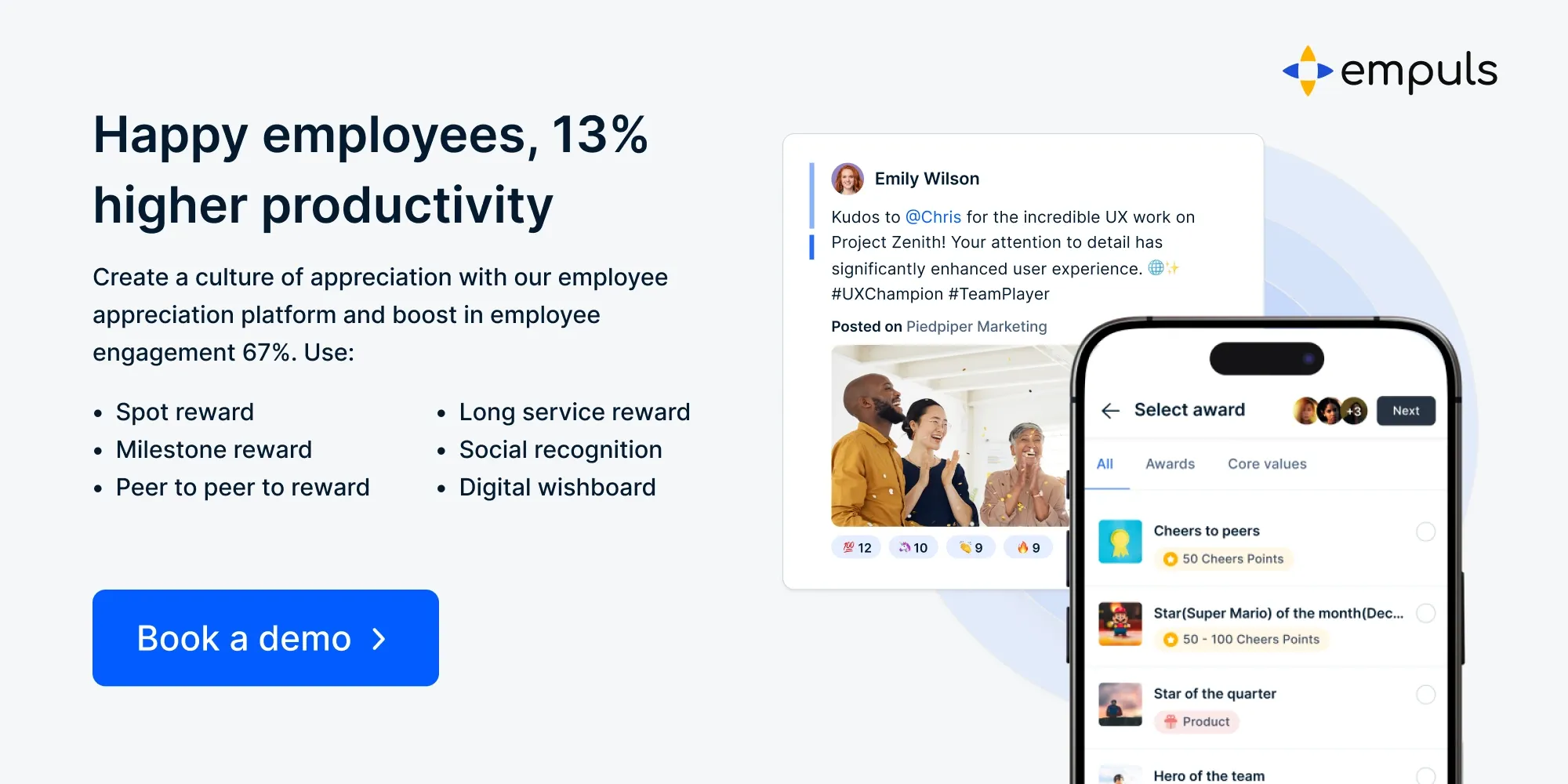
FAQs
1. Was sind die drei Arten von Anreizen?
Anreize sind Instrumente, die von Arbeitgebern eingesetzt werden, um Mitarbeiter zu motivieren und die allgemeine Arbeitszufriedenheit zu verbessern. Sie lassen sich im Allgemeinen in drei Kategorien einteilen:
- Monetäre Anreize: Beispiele hierfür sind Geldprämien, Gewinnbeteiligungen und finanzielle Anreize wie z. B. Mitarbeiterbeteiligungsprogramme. Diese Belohnungen zielen darauf ab, die Leistung der Mitarbeiter direkt zu steigern und sie zu ermutigen, die Unternehmensziele zu erreichen.
- Nicht-monetäre Anreize: Dazu gehören Anerkennungsprogramme, berufliche Entwicklungsmöglichkeiten und Wellnessangebote. Sie geben den Mitarbeitern das Gefühl, geschätzt zu werden, und fördern die Loyalität, ohne dass sie unbedingt Geldprämien bieten müssen.
- Soziale Anreize: Teamausflüge, Mentorenprogramme und integrative Praktiken am Arbeitsplatz fördern die Kameradschaft unter den Mitarbeitern, fördern ein positives Arbeitsumfeld und steigern die Moral.
2. Was ist ein Anreiz? Zum Beispiel:
Ein Anreiz ist eine Belohnung oder Anerkennung, die positive Verhaltensweisen oder Leistungen fördert. Ein Anerkennungsprogramm, bei dem die Leistungen der Mitarbeiter mit Zertifikaten gewürdigt werden, oder ein Belohnungsprogramm, das Möglichkeiten zur beruflichen Weiterentwicklung bietet, sind beispielsweise wirksame Ideen für Anreize für Mitarbeiter.
3. Was sind gute Incentive-Geschenke für Mitarbeiter?
Gute Incentive-Geschenke schaffen ein Gleichgewicht zwischen Zweckmäßigkeit und Personalisierung. Beispiele hierfür sind Wellness-Programme, Geschenkkarten, Ressourcen für die berufliche Entwicklung und Dinge, die das Privatleben der Mitarbeiter verbessern. Durchdachte Optionen wie Mentorenprogramme oder die Erstattung von Studiengebühren tragen zur Mitarbeiterzufriedenheit bei und fördern gleichzeitig die berufliche Entwicklung.
4. Welche Anreize können den Arbeitnehmern geboten werden?
Arbeitgeber können verschiedene Anreize schaffen, um die Arbeitsmoral und das Engagement ihrer Mitarbeiter zu steigern:
- Finanzielle Anreize: Geldprämien, Gewinnbeteiligung und Geldprämien.
- Leistungen für Arbeitnehmer: Krankenversicherung, flexible Arbeitszeiten und Wellness-Leistungen.
- Berufliche Entwicklung: Erstattung von Studiengebühren, Mentorenprogramme und Möglichkeiten zur beruflichen Weiterentwicklung.
- Anerkennungsprogramme: Öffentliche Anerkennung von Mitarbeiterleistungen oder Belohnungsprogramme für konstante Leistung.
- Work-Life-Balance-Initiativen: Zusätzliche Urlaubstage, hybride Arbeitsformen oder Wellness-Programme, um das Leben der Mitarbeiter ganzheitlich zu verbessern.
5. Was sind die vier Beispiele für Anreize?
- Monetäre Belohnungen: Geldanreize wie Boni oder Gewinnbeteiligungen.
- Wellness-Vorteile: Mitgliedschaften in Fitnessstudios, Krankenversicherungen oder Wellness-Programme.
- Anerkennungsprogramme: Hervorhebung der Leistungen der Mitarbeiter oder Feier von Meilensteinen zur Förderung des Mitarbeiterengagements.
- Team Anreize: Ausflüge oder gemeinsame Belohnungen für ganze Teams zur Förderung der Zusammenarbeit.
6. Wie viel kosten die Anreizprogramme für Mitarbeiter?
Die Kosten für Mitarbeiter-Incentive-Programme variieren je nach Gestaltung und Umfang stark. Kleinere Initiativen wie Anerkennungsprogramme können minimale Beträge kosten, während umfassende Wellness-Programme, Mitarbeiterbeteiligungsprogramme oder Geldprämien erhebliche Investitionen erfordern können. Erfolgreiche Mitarbeiterbeteiligungsprogramme bieten sinnvolle Belohnungen, die ihre Kosten aufwiegen, die Produktivität steigern und die Mitarbeiter an das Unternehmen binden.
7. Wie schaffen Sie Anreize für Mitarbeiter ohne Geld?
Nicht-monetäre Anreize sind ein wirksames Mittel, um Mitarbeiter zu motivieren und gleichzeitig die Budgets zu schonen. So geht's:
- Berufliche Entwicklungsmöglichkeiten anbieten: Bieten Sie die Erstattung von Studiengebühren oder Mentorenprogramme an.
- Anerkennungsprogramme: Feiern Sie Erfolge öffentlich oder führen Sie ein punktebasiertes Belohnungsprogramm ein.
- Förderung der Work-Life-Balance: Flexible Zeitpläne oder zusätzliche freie Zeit.
- Fördern Sie positive Verhaltensweisen: Schaffen Sie eine integrative Arbeitgeberkultur, die das Wohlbefinden der Mitarbeiter aktiv unterstützt.
- Den Teamgeist stärken: Organisieren Sie Teamausflüge und beteiligen Sie die Teammitglieder an Entscheidungsprozessen.












